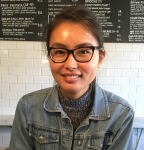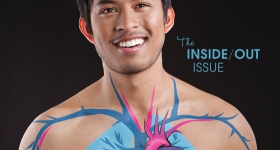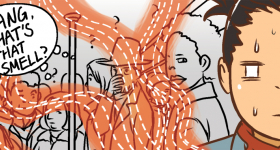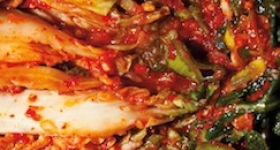In November, Ann Soh Woods, founder of Soh Spirits (makers of Kikori Whiskey and Yuzuri), released a brand new, limited-edition Kikori expression called Kikori Ten. This variation is made with 100 percent rice on the island of Kyushu, Japan, and has been aged in sherry casks for 10 years. With only 312 bottles available on the market, whiskey lovers will need to hurry.
In the male-dominated spirits business, Ann is a rarity as a female owner of a whiskey brand. The company just opened a new office in Los Angeles and has filled the space with pieces in promotion of L.A.-based female POC artists. Soh Spirits is shaking up the booze game with its innovative rice whiskey formula and the company’s mission statement of inclusivity.
Hyphen Magazine had a chance to catch up with Ann to talk about childhood pretend Hello Kitty tea parties, her love for Japanese culture and breaking down racial and gender barriers in the spirits industry.
Tell me a bit about who you are and how you got into whiskey.
I am a Midwest born, Korean American woman who is the founder and owner of Kikori Whiskey, the first ever Japanese rice whiskey introduced in America.
While I had no background in the spirits industry, I did have a passion for food, wine, spirits and Japan. I have to confess that my love for Japan began with Hello Kitty, but eventually I moved on to admire the culture, food, art and, of course, the many great spirits in Japan. I wanted to bring a sophisticated, unique spirit to the United States that was refreshing, would go well in cocktails and represent the beauty of Japan.
Talk about the importance of your representation as an Asian American woman in the whiskey business.
I started to say there are not nearly enough Asian American women in the spirits industry, but that’d be the least of it. There are not nearly enough women in the industry! This is beginning to change, but there is a long way to go. I am aware and try to speak up when I can on behalf of women in the industry. Growing up as an Asian American in the Midwest and attending college in Texas, I understand the feeling of being an outsider, and I want to break down barriers whenever possible.
How did you get started in the industry? How did you start this company?
I started this journey because I wanted to create a specific spirit for the United States and thought there might be others that would enjoy it as well.
I was lucky enough to have friends who knew how to connect me to various distilleries in Japan. We chose one to work with and, once we had our liquid, I hit the market hard, selling Kikori by hand, often by cold calling!
We got a great response from consumers, and distributors started cold calling me. I hit the ground running and never looked back.
What challenges do you face as a female whiskey manufacturer in such a male-dominated industry and spirits culture?
I have been so fortunate to have both female and male role models who have helped guide me. And today, I am so proud to know several dynamic female founders. We can share stories and strategies to navigate the challenges of the industry. I know people are sometimes surprised when they meet me, but I take it in stride. It’s a great opportunity to show them a new face of what they perceive a founder/owner should look like.
On the consumer side, we are seeing more and more women participate in all phases of the industry, so this will change some of the dated attitudes and dynamics.
What advice do you have for women who are starting out in the industry?
Knowledge of the industry and a commitment to education is key! Learn everything you can about spirits and the spirits industry. I learned a few too many lessons the hard way. Find a mentor or follow (stalk) someone you admire and ask loads of questions. You may not even know exactly what you want to do and that’s OK. Keep an open mind as there are so many interesting aspects of the industry that you may find one that suits you best.
Also, don’t be shy about any questions. If you don’t ask, it could take you a lot longer to find out. Before I jumped in, I searched for anyone who had done this before. If I got to meet someone who did, the first thing I would ask is what mistakes did you make? It was invaluable.
And finally, trust your own instincts!
Did you always want to work in spirits?
No! Growing up I certainly never imagined that my pretend tea parties with Hello Kitty would morph into real cocktail parties!
What makes the West Coast/Los Angeles spirits scene different from other areas?
West Coast consumers are adventurous! I think with our incredible diversity in California, it naturally keeps people more open minded. They are willing to try new things and expand their palate. They are eager to be educated and while some ingredients or new ideas might be resisted in other areas of the country, it’s embraced on the West Coast. Using rice as the grain in whiskey may have been confusing to many but in California, we were quickly accepted. Rice is a grain that they are familiar with already.
What are some ways that Kikori Whiskey supports pro-women and pro-LGBT organizations?
As a company and personally, we are definitely supportive of organizations and groups that extend from my personal beliefs. Every year, we support the Planned Parenthood Food Fare, Simply diVine which supports the Los Angeles LGBT Center, Purple Lily Awards which honors leaders in the Latin LGBTQ community of Los Angeles, the LA Chefs for Human Rights among other organizations that can benefit from Kikori donations, full bar or cocktails. We currently have an office of all women who share in my connection to support these organizations and are encouraged to bring any ideas to the team.
We are hoping to offer our signature maneki neko cups next year with Pride colors and have proceeds go back to an LGBTQ organization. We always want to be sure that these are not business decisions, but come from our hearts. I am lucky to have a team that believes in these organizations and who work with me on supporting these groups and organizations.
What’s the most interesting thing you’ve learned about making whiskey?
I don’t actually make the whiskey, that’s the job of our very expert and experienced master distiller. However, I did try blending once, feeling confident that I knew exactly how I would want it to taste but mine turned out to be pathetic. It’s obviously an art and science that has so many nuances yet can also be so simple at the same time.
How do you see the industry changing?
For the whiskey category, it’s a bright outlook. More and more consumers are requesting whiskey cocktails and it’s gaining popularity, especially among women. An old-fashioned cocktail is no longer just a man’s drink, a la the Mad Men era. More women are ordering outside the box. We are also seeing more women behind the bar as master distillers, making buying decisions, running companies and even in management roles at the distributor level.
What’s your favorite part of the job?
Meeting those who work in the industry. It’s a vast array of different types of people but nearly everyone has a passion for whatever they are into, be it wine, spirits, cooking or running a bar or restaurant.
I’ve made some very meaningful connections and deep friendships.
What’s your favorite way to drink whiskey?
Right now, an Old Fashioned. At Kikori, we have a fun twist making it with a Japanese shiso.
Do you have any advice for Asian American women who want to break into the spirits industry?
Don’t back away from who you are. Just because the landscape may look one way does not mean you have to adapt or fit into that mold. Take pride in your history and any unique perspective you can bring. It only makes the industry stronger and much more interesting!










Comments